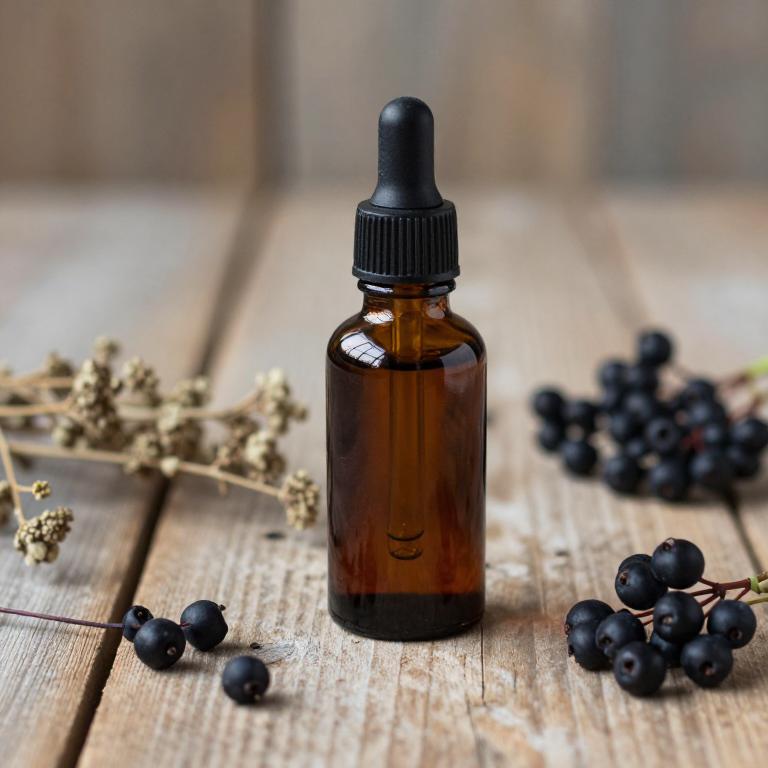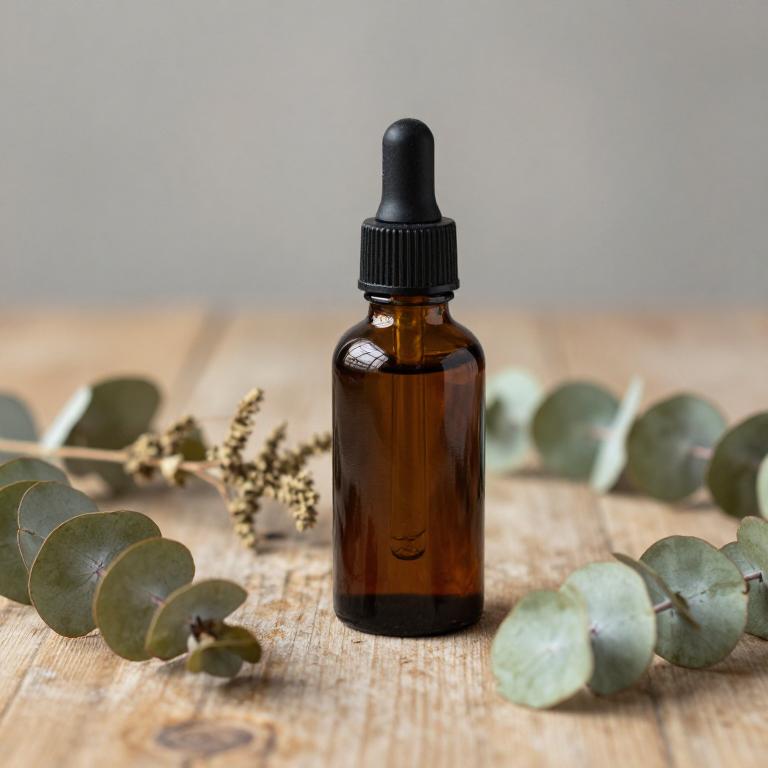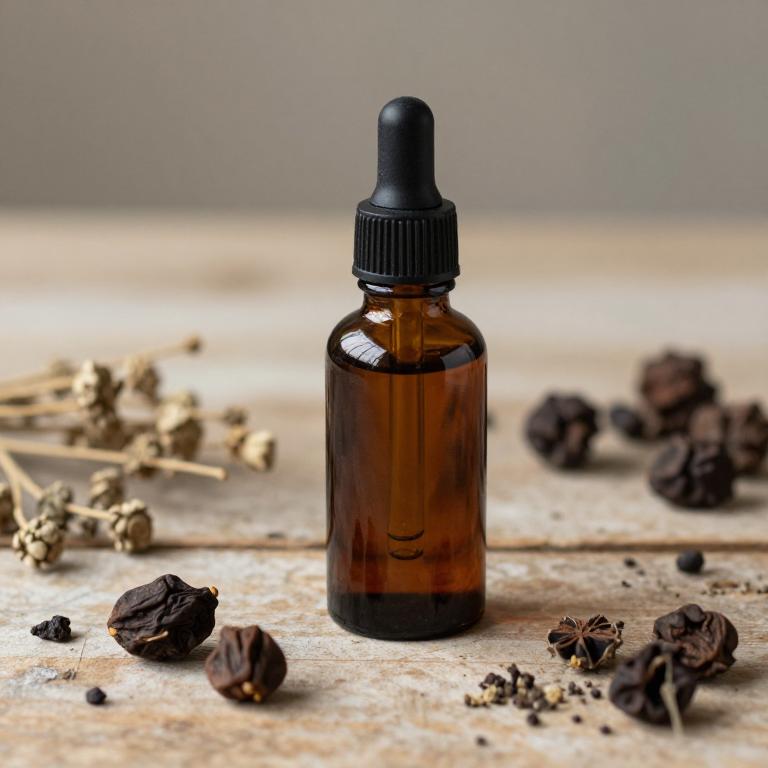10 Best Herbal Tinctures For Throat Congestion

Herbal tinctures are concentrated liquid extracts made from dried herbs, often used to alleviate throat congestion by soothing inflammation and reducing mucus production.
Commonly used herbs in these tinctures include echinacea, goldenseal, and sage, each known for their antimicrobial and anti-inflammatory properties. They are typically taken orally, diluted in water or tea, and can provide relief from symptoms such as sore throat and coughing. Many people prefer tinctures for their convenience and potency compared to traditional teas or pills.
However, it is important to consult a healthcare professional before use, especially for those with existing medical conditions or taking other medications.
Table of Contents
- 1. Ginger (Zingiber officinale)
- 2. Thyme (Thymus vulgaris)
- 3. Peppermint (Mentha piperita)
- 4. Fennel (Foeniculum vulgare)
- 5. Black elderberry (Sambucus nigra)
- 6. Salvia (Salvia officinalis)
- 7. Rosemary (Rosmarinus officinalis)
- 8. Echinacea (Echinacea purpurea)
- 9. Eucalyptus (Eucalyptus globulus)
- 10. Black pepper (Piper nigrum)
1. Ginger (Zingiber officinale)

Zingiber officinale, commonly known as ginger, has been traditionally used for its therapeutic properties, and its herbal tinctures are increasingly being recognized for their potential to alleviate throat congestion.
The active compounds in ginger, such as gingerol and shogaol, possess anti-inflammatory and analgesic effects that can reduce swelling and discomfort in the throat. When prepared as a tincture, ginger can be easily absorbed by the body, offering a concentrated form of its medicinal benefits. It is often used in combination with other herbs like licorice or eucalyptus to enhance its effectiveness for respiratory conditions.
However, individuals with gastrointestinal sensitivities or those on medication should consult a healthcare provider before using ginger tinctures.
2. Thyme (Thymus vulgaris)

Thymus vulgaris, commonly known as thyme, is a herb widely used in traditional medicine for its potent antiseptic and expectorant properties.
Thyme tinctures are often employed to alleviate symptoms of throat congestion due to their ability to reduce mucus production and soothe irritated tissues. The active compounds in thymus vulgaris, such as thymol and carvacrol, contribute to its effectiveness in fighting respiratory infections and easing breathing. When used as a tincture, thyme can be diluted in water or taken directly under the tongue for rapid relief.
It is important to consult a healthcare professional before using thyme tinctures, especially for prolonged or severe throat congestion.
3. Peppermint (Mentha piperita)

Mentha piperita, commonly known as peppermint, is often used in herbal tinctures to alleviate throat congestion due to its soothing and decongestant properties.
The active compound, menthol, helps to relax the muscles in the throat and reduce inflammation, making it easier to breathe and swallow. Peppermint tinctures can be taken orally or used as a gargle to provide quick relief from sore throat and coughing. They are particularly effective for symptoms caused by colds, allergies, or respiratory infections.
However, individuals with certain medical conditions or those taking specific medications should consult a healthcare professional before using peppermint tinctures.
4. Fennel (Foeniculum vulgare)

Foeniculum vulgare, commonly known as fennel, is often used in herbal tinctures to alleviate throat congestion due to its expectorant and anti-inflammatory properties.
The tincture is typically prepared by soaking crushed fennel seeds in alcohol, allowing the active compounds to extract over time. This herbal remedy is believed to help loosen mucus and reduce inflammation in the respiratory tract, making it easier to breathe. It is often recommended for mild cases of coughs and sore throats, especially when accompanied by excess mucus.
However, it is important to consult a healthcare professional before use, particularly for individuals with allergies or those taking other medications.
5. Black elderberry (Sambucus nigra)

Sambucus nigra, commonly known as European elderberry, is often used in herbal tinctures to alleviate throat congestion due to its anti-inflammatory and antiviral properties.
These tinctures are typically made by soaking the dried berries in alcohol to extract their active compounds, such as flavonoids and anthocyanins. The soothing effects of elderberry tinctures can help reduce swelling and irritation in the throat, making them a popular remedy for colds and sore throats. When used as part of a holistic approach, these tinctures may support the body's natural defenses against respiratory infections.
However, it is important to consult a healthcare professional before use, especially for individuals with allergies or chronic health conditions.
6. Salvia (Salvia officinalis)

Salvia officinalis, commonly known as sage, is a traditional herb used in herbal tinctures to alleviate throat congestion due to its anti-inflammatory and antimicrobial properties.
These tinctures are typically prepared by steeping dried sage leaves in alcohol, which helps extract the beneficial compounds such as thujone and flavonoids. Sage tinctures can help reduce mucus production and soothe irritated throat tissues, making them a popular remedy for sore throats and coughs. When used as a gargle or diluted in water, they provide a natural alternative to conventional throat lozenges.
However, it is important to consult a healthcare professional before use, especially for pregnant individuals or those with existing health conditions.
7. Rosemary (Rosmarinus officinalis)

Rosmarinus officinalis, commonly known as rosemary, is widely used in herbal tinctures for its soothing properties that can help alleviate throat congestion.
The essential oils in rosemary, such as camphor and cineole, possess antimicrobial and anti-inflammatory effects that may reduce irritation and inflammation in the throat. When prepared as a tincture, rosemary can be diluted and used as a gargle or applied topically to the neck to provide relief from soreness and mucus buildup. Its aromatic qualities also help to open up the airways and promote easier breathing.
While rosemary tinctures are generally considered safe, it is advisable to consult a healthcare professional before use, especially for those with known allergies or medical conditions.
8. Echinacea (Echinacea purpurea)

Echinacea purpurea herbal tinctures are commonly used to support the immune system and alleviate symptoms of throat congestion.
These tinctures are typically made by soaking the dried roots and leaves of the echinacea plant in alcohol, allowing the active compounds to be extracted. They are believed to have anti-inflammatory and antimicrobial properties that may help reduce swelling and fight off infections in the throat. When used as a complementary therapy, echinacea tinctures can provide relief from soreness and discomfort associated with colds or throat infections.
However, it is important to consult a healthcare professional before use, especially for individuals with allergies or those taking other medications.
9. Eucalyptus (Eucalyptus globulus)

Eucalyptus globulus, commonly known as eucalyptus oil, is often used in herbal tinctures to alleviate throat congestion due to its expectorant and anti-inflammatory properties.
These tinctures typically contain a concentrated form of eucalyptus oil diluted in alcohol, making it easier to ingest and absorb into the body. The active compounds in eucalyptus, such as cineole, help loosen mucus and reduce swelling in the respiratory tract, providing relief from coughing and sore throat. When used as directed, eucalyptus globulus tinctures can be a natural alternative for those seeking relief from mild to moderate throat congestion.
However, it is important to consult with a healthcare professional before use, especially for individuals with allergies or underlying health conditions.
10. Black pepper (Piper nigrum)

Piper nigrum, commonly known as black pepper, has been traditionally used in herbal medicine for its potential therapeutic properties.
When prepared as a tincture, piper nigrum may help alleviate throat congestion due to its expectorant and anti-inflammatory effects. The active compound, piperine, is believed to enhance the body's natural ability to expel mucus and reduce irritation in the respiratory tract. While some studies suggest its benefits, it is important to consult a healthcare professional before using it, especially for individuals with chronic respiratory conditions.
Overall, piper nigrum tinctures may serve as a complementary remedy for mild throat congestion, though they should not replace conventional medical treatments.